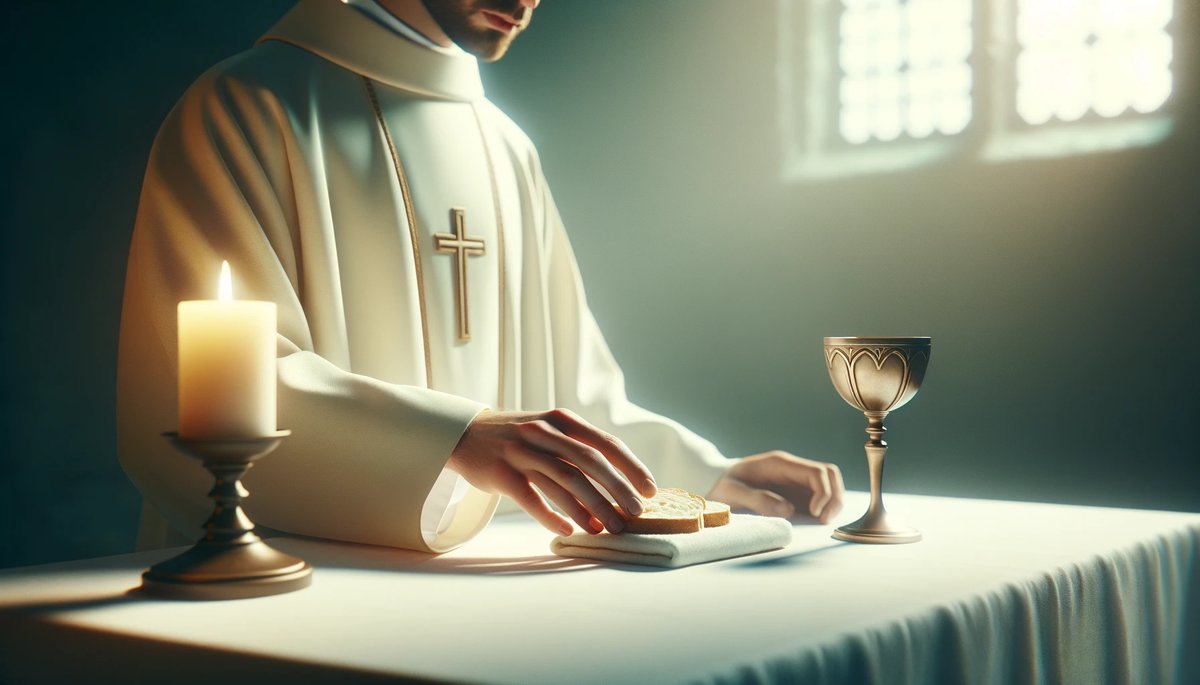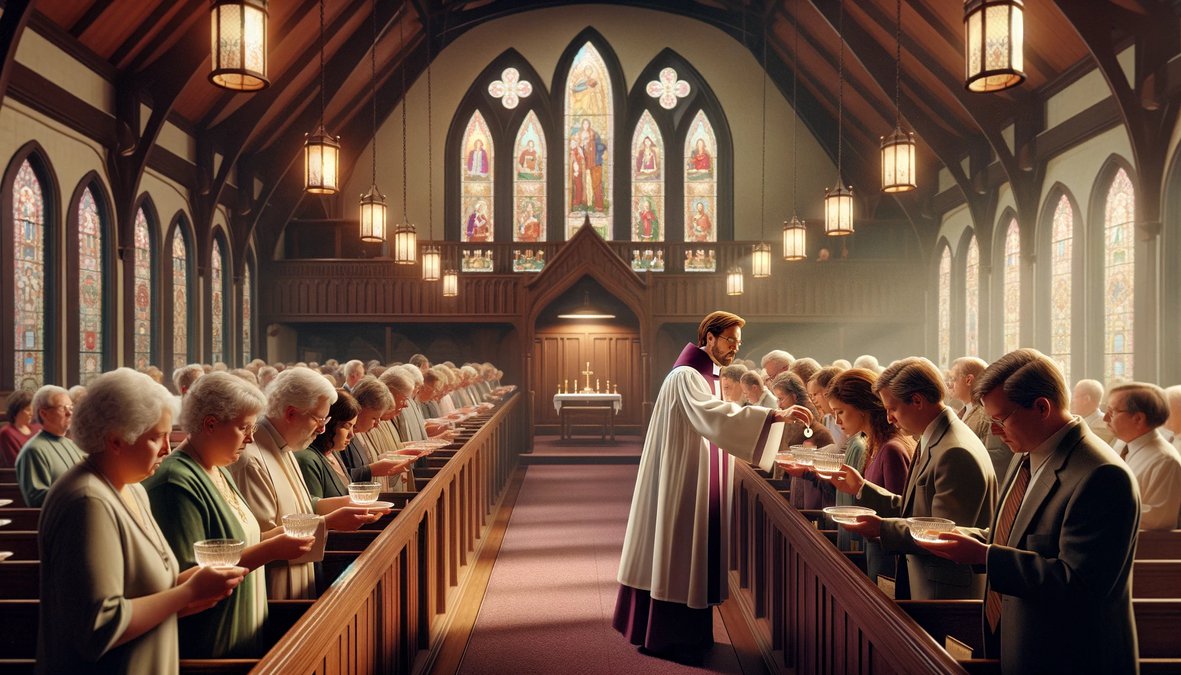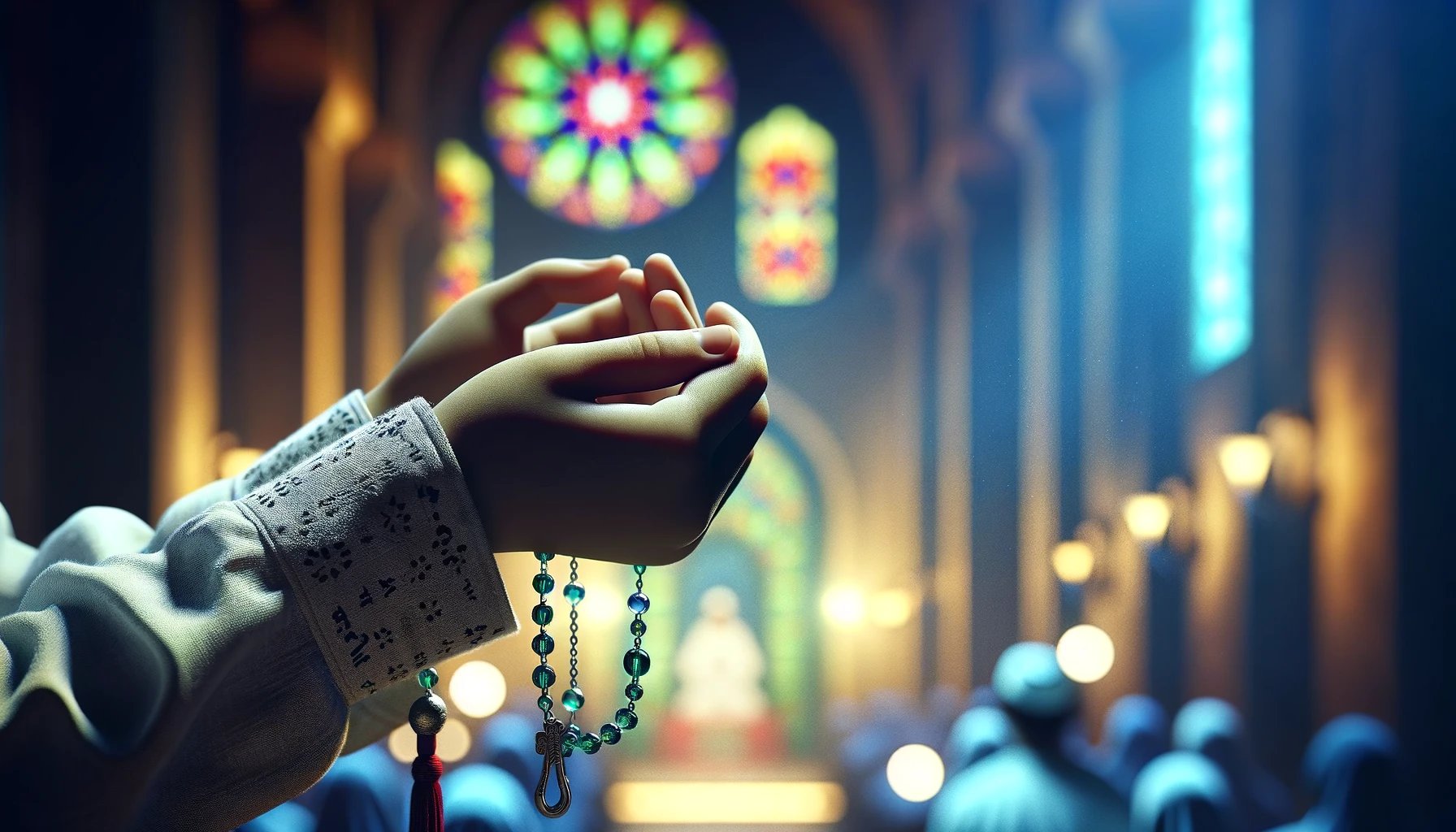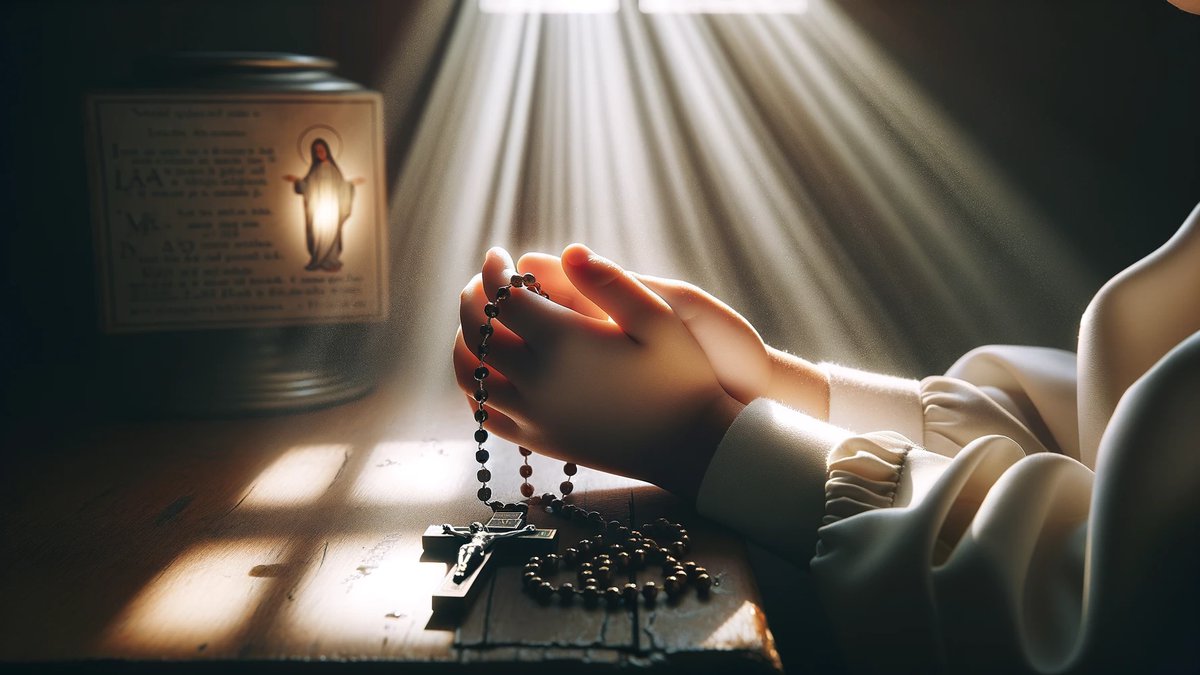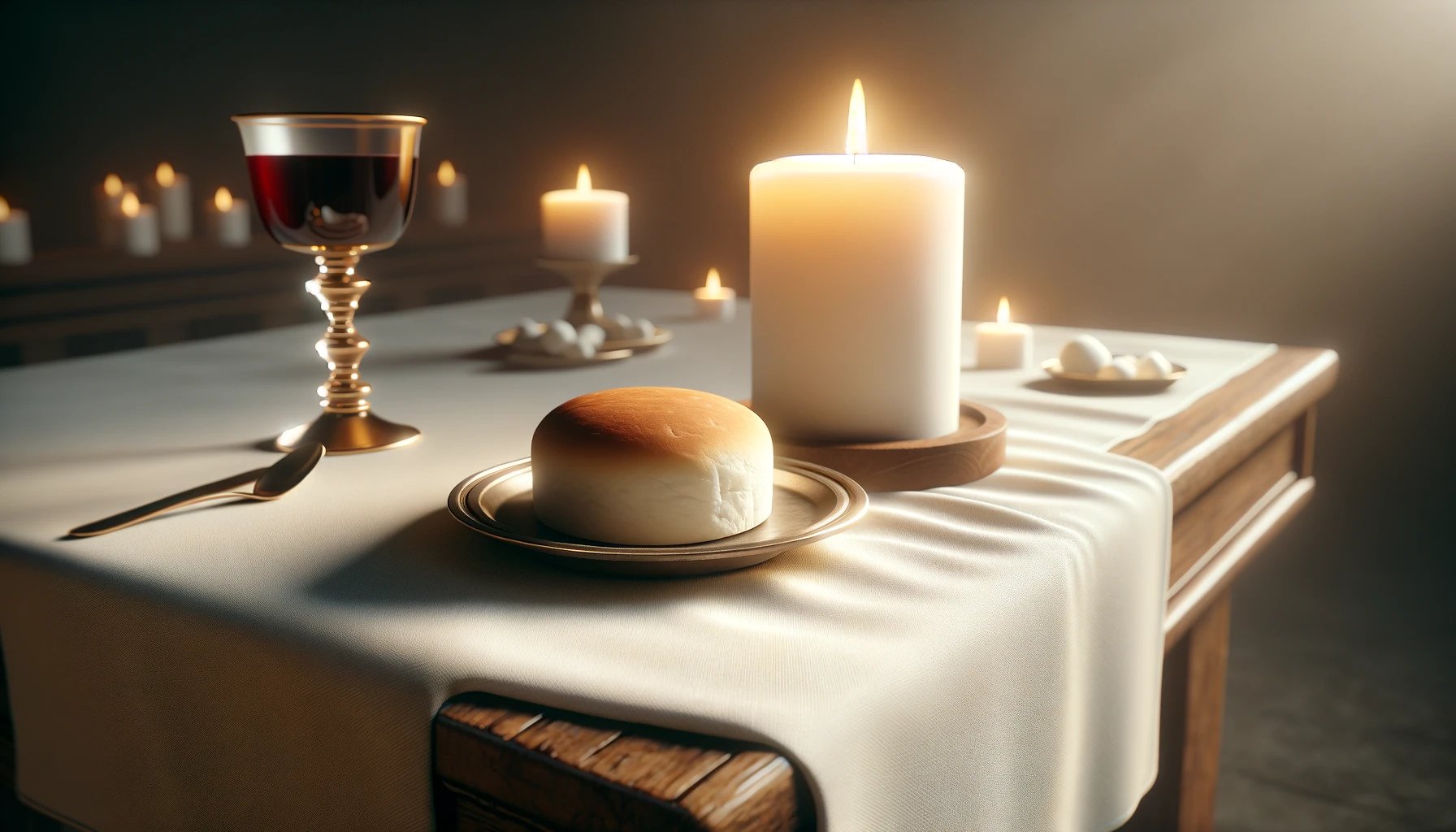Home>Theology and Spirituality>How To Take The Holy Communion


Theology and Spirituality
How To Take The Holy Communion
Published: February 19, 2024
Peter Smith, Editorial Director at Christian.net, combines deep insights into faith, politics, and culture to lead content creation that resonates widely. Awarded for his contributions to religious discourse, he previously headed a major organization for religious communicators, enhancing dialogue on faith's societal impacts.
Learn the significance and process of taking the Holy Communion in theology and spirituality. Discover the spiritual and religious practices involved.
(Many of the links in this article redirect to a specific reviewed product. Your purchase of these products through affiliate links helps to generate commission for Christian.net, at no extra cost. Learn more)
Table of Contents
Introduction
The Holy Communion, also known as the Eucharist or the Lord's Supper, holds profound significance in Christian theology and spirituality. It is a sacred ritual that symbolizes the sacrificial death and resurrection of Jesus Christ and the spiritual nourishment of believers. The act of partaking in the Holy Communion is deeply rooted in the teachings of Jesus Christ and has been a central element of Christian worship for centuries.
The Holy Communion serves as a powerful reminder of the ultimate sacrifice made by Jesus for the redemption of humanity. It is a solemn yet joyous occasion that brings together believers to commemorate the Last Supper, where Jesus shared bread and wine with his disciples, instructing them to do the same in remembrance of him.
This sacred practice transcends denominational boundaries and is celebrated in various forms across Christian traditions, uniting believers in a shared expression of faith and reverence. Whether it is observed as a symbolic reenactment of the Last Supper or as a mystical participation in the body and blood of Christ, the Holy Communion holds a central place in the hearts of Christians worldwide.
As we delve into the profound significance of the Holy Communion, we will explore the spiritual and theological underpinnings of this sacred ritual, the preparation and participation involved, and the transformative impact it can have on the lives of believers. Join us on this enlightening journey as we uncover the timeless truths and spiritual richness encapsulated in the Holy Communion.
Read more: Who Takes Holy Communion
Understanding the significance of the Holy Communion
The Holy Communion holds profound significance in the Christian faith, serving as a tangible expression of the central beliefs and values held by believers. At its core, the Holy Communion symbolizes the sacrificial death and resurrection of Jesus Christ, as well as the spiritual nourishment and unity of the body of believers.
Symbolism of the Last Supper
The roots of the Holy Communion can be traced back to the Last Supper, where Jesus shared bread and wine with his disciples, imparting profound spiritual significance to these elements. The bread represents the body of Christ, broken for the redemption of humanity, while the wine symbolizes the blood of Christ, shed for the forgiveness of sins. This symbolic act of sharing a communal meal with his disciples encapsulated the essence of Jesus' impending sacrifice and the establishment of a new covenant based on grace and redemption.
Spiritual Nourishment and Unity
Partaking in the Holy Communion is not merely a symbolic ritual but a deeply spiritual experience that nourishes the faith of believers. It serves as a tangible reminder of the indwelling presence of Christ and the spiritual sustenance derived from a vibrant relationship with Him. Moreover, the act of partaking in the Communion fosters a sense of unity and fellowship among believers, transcending individual differences and uniting them in a shared experience of faith and devotion.
Remembrance and Anticipation
The Holy Communion also embodies the dual nature of remembrance and anticipation. It calls believers to remember and reflect on the sacrificial love of Christ, the ultimate expression of God's grace and mercy. Simultaneously, it fosters an eager anticipation of the future consummation of God's kingdom, where believers will partake in the heavenly banquet in the presence of the Lord.
Spiritual Renewal and Transformation
Participating in the Holy Communion offers believers an opportunity for spiritual renewal and transformation. It is a sacred moment of encounter with the living Christ, where believers are invited to examine their hearts, seek forgiveness, and reaffirm their commitment to living a life reflective of Christ's teachings. The Communion table becomes a place of divine encounter, where believers are invited to lay down their burdens and receive the restorative grace and love of God.
In essence, the Holy Communion stands as a powerful symbol of Christ's redemptive work, a source of spiritual nourishment and unity, a call to remembrance and anticipation, and a catalyst for spiritual renewal and transformation. Its significance reverberates through the annals of Christian history, serving as a timeless testament to the enduring love and grace of God manifested through Jesus Christ.
Preparing for the Holy Communion
Preparing for the Holy Communion is a deeply personal and spiritual process that encompasses both introspection and reverence. It involves a deliberate and mindful approach to align one's heart and mind with the sacred significance of partaking in this solemn ritual. Whether it is a regular practice within a church community or a special occasion, the preparation for the Holy Communion holds immense value in nurturing a meaningful and transformative experience for the participants.
Self-Examination and Reflection
Central to the preparation for the Holy Communion is the practice of self-examination and reflection. Believers are encouraged to engage in introspection, examining their thoughts, attitudes, and actions in light of their faith. This introspective process involves seeking reconciliation with God and others, acknowledging areas of spiritual growth, and expressing genuine contrition for any shortcomings. It is a time for believers to humbly approach the Communion table, acknowledging their need for grace and renewal.
Prayer and Spiritual Readiness
Prayer plays a pivotal role in preparing for the Holy Communion. Through prayer, believers seek spiritual readiness and receptivity to the profound significance of the Communion experience. They express gratitude for the redemptive work of Christ, seek cleansing and renewal, and open their hearts to receive the spiritual nourishment offered through the Communion elements. Prayer becomes a means of aligning one's spirit with the sacred purpose of the Communion, fostering a sense of anticipation and reverence.
Read more: How To Wish Holy Communion
Examination of Heart and Intentions
Preparing for the Holy Communion also entails an examination of the heart and intentions. Believers are called to approach the Communion table with sincerity and authenticity, purposing to partake in a manner that honors the significance of the ritual. This involves cultivating a spirit of humility, gratitude, and unity with fellow believers. It also entails a commitment to live in accordance with the teachings of Christ, embracing the transformative power of the Communion experience in shaping their lives and relationships.
Reverent Attitude and Anticipation
A reverent attitude and a sense of anticipation characterize the preparation for the Holy Communion. Believers are encouraged to approach the Communion table with a deep sense of awe and reverence, acknowledging the sacred nature of the ritual. This anticipation is rooted in the expectation of encountering the living Christ, receiving spiritual nourishment, and experiencing the transformative grace of God. It is a time of joyful anticipation, as believers prepare to partake in a communal expression of faith and unity.
In essence, preparing for the Holy Communion involves a holistic approach that encompasses self-examination, prayerful readiness, sincere intentions, and a reverent anticipation of the sacred encounter. It is a time of spiritual preparation that enriches the Communion experience, deepening the participant's connection with the redemptive work of Christ and fostering a renewed commitment to living out the principles of faith and love.
Participating in the Holy Communion
Participating in the Holy Communion is a sacred and transformative experience that holds profound spiritual significance for believers. It is a communal act of worship and remembrance, symbolizing the spiritual nourishment and unity of the body of Christ. As participants approach the Communion table, they are invited to partake in the solemn yet joyous ritual with hearts filled with reverence and anticipation.
Reverent Approach and Posture
The act of participating in the Holy Communion begins with a reverent approach and posture. As believers are called forward to receive the Communion elements, they do so with a sense of solemnity and respect. The physical act of approaching the Communion table reflects an inward posture of humility and readiness to partake in the sacred ritual. This reverent approach sets the tone for a meaningful and transformative Communion experience, fostering an atmosphere of spiritual receptivity and awe.
Read more: How To Take Orthodox Communion
Receiving the Communion Elements
The act of receiving the Communion elements, typically unleavened bread and wine (or grape juice), is a symbolic and deeply meaningful gesture. As participants receive the bread, representing the body of Christ, and the cup, symbolizing the blood of Christ, they do so with a profound awareness of the spiritual significance of these elements. The act of partaking in the bread and wine serves as a tangible expression of faith, a solemn remembrance of Christ's sacrificial love, and a communal affirmation of the redemptive work of Jesus.
Communal Expression of Faith and Unity
Participating in the Holy Communion is not merely an individual act but a communal expression of faith and unity. As believers partake in the Communion together, they affirm their shared identity as members of the body of Christ. This communal aspect of the Communion underscores the interconnectedness of believers, transcending individual differences and uniting them in a shared experience of worship and remembrance. The Communion table becomes a place of unity, where believers from diverse backgrounds come together to partake in a sacred and transformative encounter with the living Christ.
Reflection and Response
Following the reception of the Communion elements, participants are invited to engage in a time of reflection and response. This may involve moments of silent prayer, expressions of gratitude for the redemptive work of Christ, and a reaffirmation of one's commitment to living a life reflective of the teachings of Jesus. The Communion experience prompts believers to examine their hearts, seek reconciliation and renewal, and respond to the transformative grace of God with humility and gratitude.
In essence, participating in the Holy Communion is a deeply spiritual and communal experience that invites believers to partake in a sacred encounter with the living Christ. It is a time of reverence, remembrance, and unity, fostering a transformative connection with the redemptive work of Jesus and nurturing a deepened sense of spiritual nourishment and fellowship within the body of believers.
Reflecting on the experience
After participating in the Holy Communion, it is essential for believers to engage in a period of reflection, introspection, and spiritual contemplation. This reflective process serves as a pivotal component of the Communion experience, allowing participants to internalize the profound significance of the ritual and its transformative impact on their faith and spiritual journey.
Reflection begins with a deep introspective examination of the Communion experience. Participants are encouraged to ponder the solemn yet joyous moments spent at the Communion table, partaking in the bread and wine, and engaging in communal worship and remembrance. This introspective reflection fosters a heightened awareness of the spiritual nourishment received and the communal unity experienced during the Communion.
Moreover, reflecting on the Communion experience prompts believers to contemplate the redemptive work of Christ and its personal relevance to their lives. It becomes a time to ponder the sacrificial love demonstrated through the broken bread and poured-out cup, symbolizing the body and blood of Jesus. This contemplation engenders a profound sense of gratitude, awe, and humility as participants acknowledge the depth of Christ's love and the transformative power of His sacrifice.
Furthermore, the reflective process invites believers to examine the impact of the Communion on their spiritual renewal and transformation. It becomes an opportunity to assess the sincerity of their response to the grace of God, the authenticity of their commitment to living out the teachings of Christ, and the depth of their unity with fellow believers. This introspective evaluation serves to reinforce the spiritual significance of the Communion and its role in shaping the lives and faith of participants.
In addition, reflecting on the Communion experience extends beyond the immediate ritual to encompass its enduring impact on daily living. Participants are encouraged to consider how the spiritual nourishment received at the Communion table influences their interactions, attitudes, and actions in their communities and the world at large. This reflective contemplation serves to reinforce the transformative nature of the Communion, inspiring believers to embody the love, grace, and unity symbolized in the ritual.
In essence, reflecting on the Communion experience is a deeply enriching and transformative process that allows believers to internalize the spiritual significance of the ritual, contemplate the redemptive work of Christ, evaluate their spiritual renewal, and extend the transformative impact of the Communion into their daily lives. It serves as a sacred opportunity for believers to deepen their connection with the living Christ and reaffirm their commitment to living out the principles of faith, love, and unity exemplified in the Communion.
Conclusion
The Holy Communion stands as a timeless testament to the enduring love and grace of God, encapsulating the profound significance of Christ's redemptive work and the spiritual nourishment and unity experienced by believers. As we conclude this enlightening journey into the depths of the Holy Communion, it is evident that this sacred ritual transcends mere symbolism, serving as a transformative encounter with the living Christ.
From the symbolism of the Last Supper to the spiritual renewal experienced through participation, the Holy Communion embodies the essence of Christian faith and unity. It calls believers to remember the sacrificial love of Christ, anticipate the future consummation of God's kingdom, and reflect on their spiritual journey with humility and gratitude.
The preparation for the Holy Communion involves a holistic approach of self-examination, prayerful readiness, sincere intentions, and a reverent anticipation of the sacred encounter. It is a time of spiritual preparation that enriches the Communion experience, deepening the participant's connection with the redemptive work of Christ and fostering a renewed commitment to living out the principles of faith and love.
Participating in the Holy Communion is a deeply spiritual and communal experience that invites believers to partake in a sacred encounter with the living Christ. It is a time of reverence, remembrance, and unity, fostering a transformative connection with the redemptive work of Jesus and nurturing a deepened sense of spiritual nourishment and fellowship within the body of believers.
After participating in the Holy Communion, engaging in a period of reflection, introspection, and spiritual contemplation becomes essential. This reflective process allows participants to internalize the profound significance of the ritual and its transformative impact on their faith and spiritual journey. It becomes a sacred opportunity for believers to deepen their connection with the living Christ and reaffirm their commitment to living out the principles of faith, love, and unity exemplified in the Communion.
In essence, the Holy Communion transcends time and tradition, serving as a sacred bridge that unites believers across generations and denominations. It is a tangible expression of the enduring love and grace of God, a communal affirmation of faith and unity, and a transformative encounter with the living Christ. As believers partake in the Holy Communion, they are invited to embrace the profound significance of this sacred ritual, allowing it to shape their lives, deepen their faith, and foster a vibrant sense of unity within the body of Christ.
